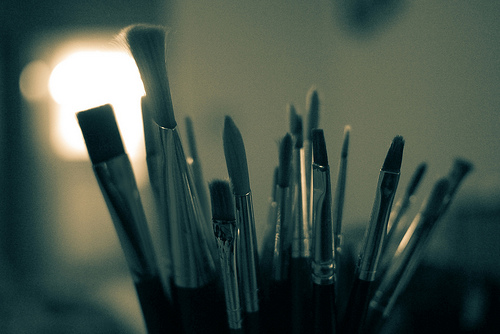By Michael Scoular (The Cascade) – Email
Print Edition: April 4, 2012
For the third roundtable session organized and attended by the College of Arts this academic year, the importance, feasibility and methodologies of teaching creativity to students was discussed and thought through.
The roundtable was more of a conversation—to infuse the days and semesters to come with a spirit of collaborative learning—rather than a meeting that would bring about immediate change in the curriculum. At the forefront was the discussion about what could be done differently – and how professors need to think differently about creativity in the classroom.
The key issues that arose over the course of the panel included the questions of if working in the creative arts is “useful” in the world outside of an institution of learning, or even if creativity is something that is properly fostered in the BA program as it is now. Dean of Trades John English saw the programs at UFV as being too separate, calling for a “transdisciplinarian approach.” That is, an approach where the “nuisance” barriers between programs that make taking trades courses—which he presented as a creative setting of another kind, where problem solving and the creative process can take on another kind of application—could be more easily accessed and taken as elective courses.
Theatre department head Bruce Kirkley spoke of how the skills developed in acting can be creatively applied in many other areas of work, and English professor (now on sabbatical) John Carroll pointed out how credentials alone don’t make for a convincing resume. “Problems aren’t disciplinary,” Carroll stated, emphasizing not only the value of being able to take a wider variety of courses but the creative environment in those classes that must exist.
Kirkley described the creative process as “never done, never finished, never fixed” and the creative person as someone who must be “comfortable with uncertainty and risk” and “have a reverence for the unknown.” How that might take root in the classroom was developed by Visual Arts instructor Shelley Stefan, who emphasized how creativity “requires more terrain.” Stefan went on to visually display how there is no single route or approach that works best, and then spoke on how it is important to allow the room and time for that in the classroom. “I always say to my students to take ownership of your failures and experiments,” Stefan said, and this direction towards progress and cultivation rather than results is how the roundtable defined itself.
“We need to be creative educators,” Carroll continued. He acknowledged the reality that UFV is a commuter school, but also saw the role professors can play in changing that perception. As one professor from the audience put it, the university classroom needs to be “a place to solve the problems that brought you to the program in the first place.” Carroll stated the “danger of seeing education as a stepping stone” and characterized the endpoint of certification as something that “kills creativity.” Carroll considered it most important that a professor provides the time and the atmosphere in the lecture hall or classroom—the right conditions—so that a student is “allowed to open [their] mind.”
As the roundtable closed, it was with the repetition of Carroll’s earlier delineation of work (“discipline, development, studying technique”) and play (“the spontaneous, the intuitive, the inspirational”) of creative endeavors, with the addition that “we need to be a bridge between [those].”
This roundtable session will be online soon. The first two sessions, on ‘What a BA graduate should know about science’ and ‘Educating for Citizenship’, are already available on the College of Arts website in video form.


